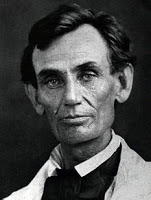On one hand, we have the consistent, explicit, and oft-repeated teachings of the prophets and apostles that the hill Cumorah (Mormon 6:6) is in New York.
On the other hand, we have the consistent, explicit and oft-repeated teachings of the intellectuals that the hill Cumorah cannot be in New York, because of M2C (Mesoamerican/two-Cumorahs theory).
These teachings are being actively imposed on students at BYU/CES, while the teachings of the prophets is completely suppressed.
 When he accepted his party’s nomination for U.S. Senator in 1858, Abraham Lincoln gave his famous speech in which he said, “A house divided cannot stand.”
When he accepted his party’s nomination for U.S. Senator in 1858, Abraham Lincoln gave his famous speech in which he said, “A house divided cannot stand.”
He was invoking Matthew 12:25. “25 And Jesus knew their thoughts, and said unto them, Every kingdom divided against itself is brought to desolation; and every city or house divided against itself shall not stand.”
Lincoln, of course, was referring to the slavery question. He went on to say, “I do not expect the Union to be dissolved — I do not expect the house to fall — but I do expect it will cease to be divided. It will become all one thing or all the other.”
I think this is true also of the Church. I expect it will cease to be divided, one way or another. The question is, will we as members side with the prophets, or with the intellectuals?
The perennial problem was well described by Hugh Nibley:
Once the true prophet has been duly rejected and passed to his reward, swarms of experts descend upon his words to begin the learned business of exegesis. The words of the dead prophets become the peculiar possession of armies of specially trained and carefully conditioned scholars.
In a very old text, Peter is reported as saying in a letter to James regarding the use of his own writings in the church: “They think they are able to interpret my own words better than I can, telling their hearers that they are conveying my very thoughts to them, while the fact is that such things never entered my mind. If they take such outrageous liberties while I am alive, what will they do after I am gone!”
Nibley, “Prophets and Scholars,” https://publications.mi.byu.edu/fullscreen/?pub=1103&index=5
It is amazing to watch this process unfold in today’s LDS Church. We have intellectuals at BYU/CES who, to confirm their M2C bias, have “duly rejected” the teachings of LDS prophets and are now telling students that they weren’t speaking as prophets anyway.
They were merely “expressing their opinions,” and, of course, they were “wrong” because today’s intellectuals know better.
I’m continually surprised that so many LDS people side with the intellectuals. In many cases, it’s innocent; many Church members don’t even know what the prophets have taught about Cumorah. The intellectuals in the Church have been diligent and persistent in suppressing the truth.
They’ve also approached this with great expertise. They’ve reframed the issue as not a question about believing and following the prophets, but instead judging the prophets and deciding that they never actually taught that Cumorah was in New York, or if they did, it was merely their incorrect opinion.
That depends on how many members of the Church choose to follow them instead of the prophets.
Source: Book of Mormon Concensus

